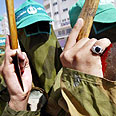
'Israel will hold talks with Hamas'
Former deputy Shin Bet chief says terror group's 'center of gravity' shifting to its political wing; dismisses grim post-pullout forecasts
In the future Israel will hold talks with Hamas, Former Deputy Shin Bet Chief Ofer Dekel said during a special Shavuot Holiday interview with Yedioth Ahronoth.
"We do not have any dialogue with them, and at this point we shouldn't. As long as they continue to conduct terror acts, we should strike them," he said. "But in the future we will hold talks with Hamas. They will also want to talk to us. I am not certain it will happen within the next year or two – but it will come."
When Dekel, 54, was appointed deputy Shin Bet chief he pushed for the targeting political and religious Hamas members, rather than just focusing on the terrorists themselves.
Although the security establishment feared this policy would garner harsh international criticism and possibly cause an outbreak of an uncontrollable global and local wave of terror, it was eventually adopted, and the fate of Hamas leaders Sheikh Ahmed Ismail Yassin and Abed Aziz Rentisi was sealed.
'Pullout good for the Jews'
Dekel, who joined the Shin Bet in 1975, said Hamas is interested in a peaceful Israeli pullout from Gaza.
"Hamas is without a doubt a terror organization, but it has a 'weakness': It is sensitive to public opinion. If it would act (violently) during the pullout, the IDF would respond and Palestinian civilians would be harmed - the finger would be pointed at Hamas," he said.
"The organization may even build a 'We drove the IDF out' ethos regarding the pullout."
Dekel, a former paratrooper, said another reason Hamas will hold its fire during the pullout is that the organization has gone through a politicization process during the past year.
"The center of gravity is slowly shifting from the group's military wing to its political one," he said. "As an organization that wants to exert influence, it is in need of funds. Hamas must avoid a situation in which Israel would act against it."
Dekel said he was not the sole disengagement proponent within the security establishment.
"In 2004 we tried to examine the (pullout) process in an in-depth manner, to predict what would happen. Finally a consensus was formed that the disengagement would be good for the Jews," he said.
'Israel has more experience'
"The disengagement will reduce terror. As there will be no Jewish settlements in Gaza, the (terror organizations') targets will not be accessible anymore," he said. "The IDF will not be there and will not have to defend itself. So, you already have two key factors that answer the question of why the pullout is beneficial from a security standpoint."
Although Dekel agrees there exist a number of factors within Palestinian society that may bring about chaos and the resurfacing of Palestinian terror, he said the grim post-pullout forecasts do not take into consideration the knowledge, power and experience Israel has gained during the past four years.
"Moreover, it should always be remembered that the future is not deterministic," he said. "Fate is not determined in advance."
Regarding the Jewish resistance to the pullout, Dekel said it depends on how much the security forces would work to control it.
"There will be violence there, but is will not stop the disengagement," he said.
Dekel said he believes the violence will not come from the Gush Katif settlers themselves.
"Their resistance is authentic. There is an ideological aspect to this, but I do not believe they would resort to violence," he said. "The biggest danger comes from those who are willing to take the extra step. They are a minority, but they can create a violent dynamic."
When asked whether he believes some anti-pullout activists have reached a decision to assassinate Prime Minister Ariel Sharon, Dekel said, "There are people who speak of it and attempt to legitimatize such a murder by comparing Sharon to Hitler."
"This is how you create the atmosphere that was prevalent in 1995 (Yitzhak Rabin's assassination)," he said.










